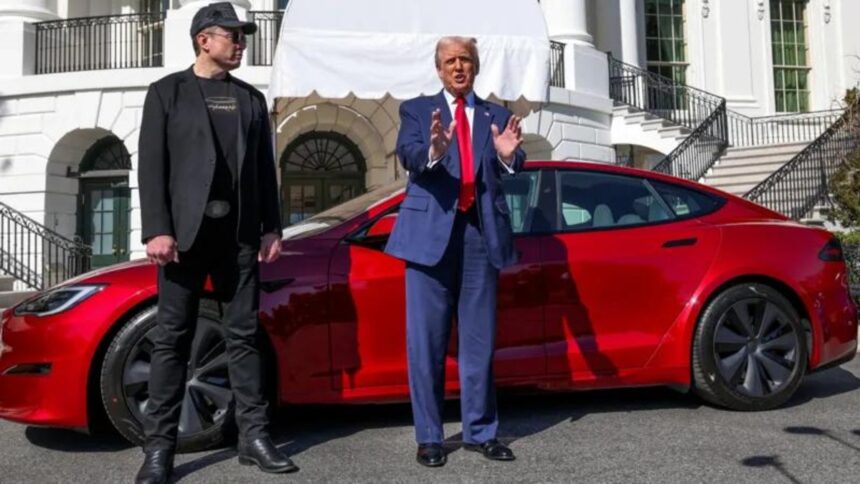Tesla owner, Elon Musk, has announced plans to scale back his involvement in United States President Donald Trump’s administration, following a sharp downturn in Tesla’s financial performance.
The electric carmaker reported a 20% drop in automotive revenue in the first quarter of 2025, compared with the same period last year, while profits fell by more than 70%.
The decline came amid growing criticism of Musk’s political role in Washington and a broader backlash against the company.
Sales slumped during the quarter as Musk became increasingly visible in the White House, serving as the head of Trump’s Department of Government Efficiency (DOGE) initiative.
On Tuesday, Tesla warned investors that it would not provide a growth forecast, citing concerns that “changing political sentiment” could “meaningfully hurt demand.”
Musk, who donated over $250 million to Trump’s re-election campaign, acknowledged that his government role had taken his attention away from Tesla.
According to the BBC, he confirmed that his “time allocation to DOGE” would “drop significantly” starting next month.
He added that he would spend only “one to two days per week on government matters ‘as long as the president would like me to do so and as long as it’s useful’.”
His involvement in the Trump administration has prompted protests and calls for boycotts of Tesla products around the world.
Musk responded to the criticism by saying the “blowback” was driven by people who would “try to attack me and the Doge team”, but defended his role as essential, stating that “getting the government house in order is mostly done”.
Tesla’s total revenue for the quarter stood at $19.3bn (£14.5bn), down 9% year-on-year and below analysts’ expectations of $21.1bn.
The company had slashed prices to attract buyers, but these measures were not enough to offset the downturn.
Tariffs imposed by the Trump administration on Chinese imports have also put pressure on Tesla’s supply chain, raising costs despite the company assembling its US-sold vehicles domestically.
“This dynamic, along with changing political sentiment, could have a meaningful impact on demand for our products in the near-term,” Tesla’s quarterly update said.
Musk has found himself at odds with other figures in Trump’s cabinet, including trade adviser Peter Navarro.
Earlier this month, Musk called Navarro a “moron” after the adviser dismissed Tesla as “not a car manufacturer” but a “car assembler, in many cases”.
Despite the tension, Musk maintained on Tuesday that Tesla was “the car company least affected by tariffs” thanks to its regional supply networks across North America, Europe and China.
Still, he admitted tariffs were “tough on a company where margins are low” and reaffirmed his stance: “I’ll continue to advocate for lower tariffs rather than higher tariffs but that’s all I can do.”
ALSO READ: Harvard University sues Trump’s govt over slashed $2.2bn funding
Looking ahead, Tesla is betting on artificial intelligence to fuel future growth, though analysts remain sceptical.
Shares in the company, which had fallen around 37% since the start of the year, rebounded more than 5% in after-hours trading after the quarterly results.
Dan Coatsworth, investment analyst at AJ Bell, said expectations were at “rock-bottom” after Tesla revealed earlier this month that car sales had dropped 13%—the lowest level in three years.
He warned that ongoing trade tensions and supply chain uncertainties posed further risks.
“Tesla’s problems are mounting,” he said.
ALSO READ TOP STORIES FROM NIGERIAN TRIBUNE
WATCH TOP VIDEOS FROM NIGERIAN TRIBUNE TV
- Let’s Talk About SELF-AWARENESS
- Is Your Confidence Mistaken for Pride? Let’s talk about it
- Is Etiquette About Perfection…Or Just Not Being Rude?
- Top Psychologist Reveal 3 Signs You’re Struggling With Imposter Syndrome
- Do You Pick Up Work-Related Calls at Midnight or Never? Let’s Talk About Boundaries







